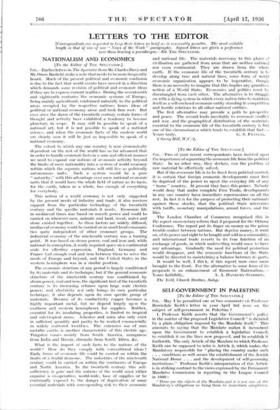[To the Editor of THE SPECTATOR.] SIR,—Two of your recent
correspondents have insisted upon the importance of separating the economic life from the political State. In no other way, they declare, can the problem of raw material be effectively solved.
But if the economic life is to be freed from political control, it is certain that foreign economic developments must first be deprived of the power to upset the everyday life of any " home " country. At present they have this power. Nobody would deny that under complete Free Trade, developments in any one country have immediate repercussions on all the rest. In fact it is for the purpose of protecting theirnationals against these shocks, that the political State intervenes with tariffs, monetary manipulations, armed forces, and the like. . .
The London Chamber of Commerce recognised this in the report on monetary reform that it prepared for the Ottawa Conference. The report put its finger on money as the prime trouble-maker between nations. But deprive money, ,it.went on, of its power and right to be bought and sold as a commodity, and international trade reverts to its true function of an exchange of goods, in which underselling would cease to have any advantage. Gradually the need for political .protection would disappear, and the economic functions, of the State would be directed to maintaining a balance between its parts.
It would be well, I thir k, if this report were once. more brought to the front.: For the alternative to some form of its proposals is an enhancement of Economic Nationalism.—












































 Previous page
Previous page